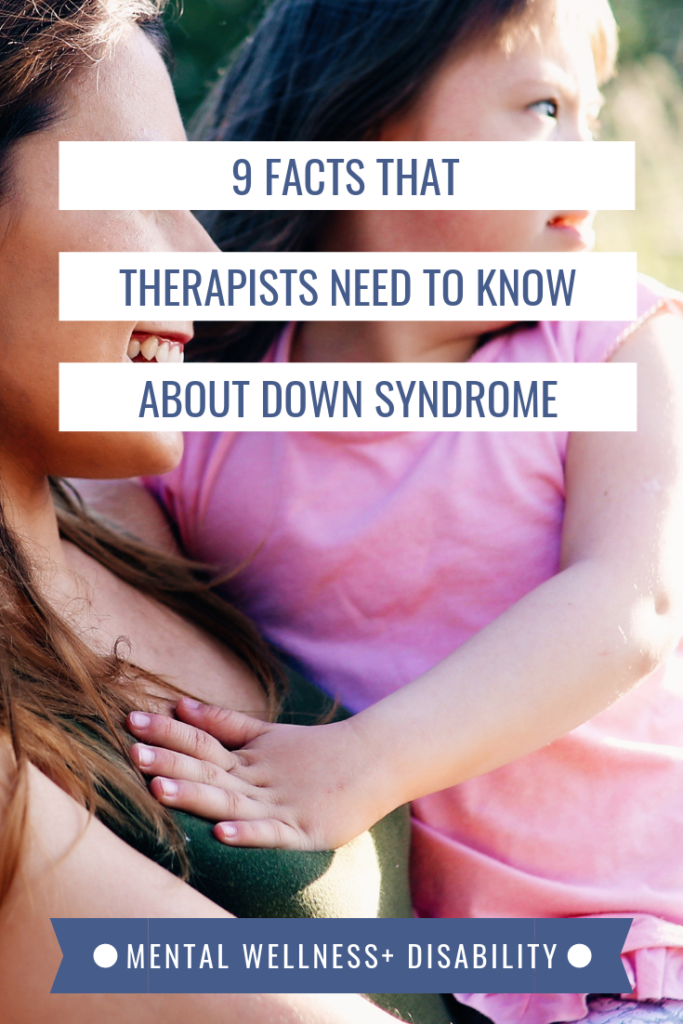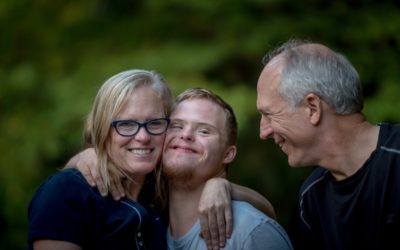Even if you don’t specialize in counseling people with Down syndrome like I do, I think it’s important that all therapists know a bit about this chromosomal disorder. There are two reasons I suggest this:
- Down syndrome is the most commonly occurring chromosomal disorder, with 1 in roughly every 700 babies being born with the condition (and that number is increasing). Down syndrome occurs in people of all races and socioeconomic statuses. In short, if you do enough counseling, you’re likely to come across someone who has Down syndrome or who has a family member with Down syndrome.
- There is a growing recognition that people with Down syndrome live rich and complex emotional lives. It used to be believed that people with Down syndrome and other intellectual disabilities weren’t capable of experiencing mental health conditions like anxiety or depression. We now understand that they do absolutely experience these conditions, probably more than people without Down syndrome do. I see that people with Down syndrome represent a hugely under-served population when it comes to counseling. I believe that, in the next decade, people with Down syndrome will seek out therapists much more often than they have in the past. Again, the odds seem to be ever increasing that you’ll eventually be asked to see a client with Down syndrome.
Disclaimer – This post will give you some very basic info that can inform your treatment planning and in session methods when working with a client who has Down syndrome or a family member. It is NOT intended to be a comprehensive review of everything you’ll need to know to provide excellent therapy. I also cannot stress enough that, while I’m using the blanket term ‘people with Down syndrome’ to present some general facts, it is 100% true that each person with Down syndrome has a unique biopsychosocial history. Don’t give in to diagnostic overshadowing!

Here are 9 facts that therapists need to know about Down syndrome:
It’s ‘Down syndrome’
Not Down’s syndrome (and certainly not just Downs!). The syndrome is named after the British physician, John Langdon Down, who was the first to categorize some of the common features of the condition in 1862.
Why this Down syndrome fact is important for therapists to know. Most parents of kids with Down syndrome have been advocating for their child their whole life, possibly even while they were in utero. Knowing that they have found a therapist who cares enough to use the correct terminology is a surprisingly huge relief to many families. So, it’s ‘Down syndrome’; Big D, little s, no apostrophes or ‘S’ in the Down.
People with Down syndrome usually have low muscle tone
This hypotonia (low muscle tone) affects all muscles throughout the body.
Why this Down syndrome fact is important for therapists to know. There are a number of ways that this comes up in therapy. It’s common for the muscles surrounding the mouth to be weak and for it to appear that people with Down syndrome are frowning when this is actually their ‘resting’ face. Be careful when making affect observations to not assume that this means a client with Down syndrome is dysthymic or apathetic.
Low muscle tone can also affect toilet training for kids with Down syndrome. Parents may seek out therapy to manage their frustration during the potty training phase. Check out my post on potty training and Down syndrome for more info.
Lastly, low muscle tone in combination with some other physiological traits (such as joint laxity and low peak oxygen uptake) mean that high impact exercise is not advisable for many people with Down syndrome due to injury risk. If you’re interested in a more detailed explanation of the challenges affecting exercise capacity for people with Down syndrome, I recommend you read this article.
If you’re working with a client who has Down syndrome and want to recommend exercise as homework, be sure to suggest a low impact regiment, such as yoga or swimming, versus something with a high risk for injury, such as soccer or basketball. Of course, many clients may participate in specialized recreation leagues (such as Special Olympics or Miracle League) that are familiar with the risks of certain exercises for people with Down syndrome and are designed to ensure their physical safety. Just check in with your client to ensure that they’re not risking injury with their chosen athletic outlet.
Infants with Down syndrome may have congenital heart conditions that require multiple surgeries shortly after birth to correct
Why this Down syndrome fact is important for therapists to know. Families raising kids with Down syndrome have usually been through a LOT before their child is even born. If they are aware of the diagnosis prenatally, they have likely experienced grief for the child that won’t be, as well as anxiety for the well-being of the child they’re having. Odds are good that they have already coordinated to find cardiac specialists to perform critical open-heart surgeries very soon after their newborn’s birth. They may have faced inquisition or outrage from family members, friends, and even healthcare professionals who don’t understand their choice to have this baby.
If a family doesn’t know that they are having a child with Down syndrome, they may face all of these emotions in one giant flood in the weeks after birth as their child is diagnosed (contrary to how it is in the movies, you cannot diagnose a newborn with Down syndrome just by looking at the baby, there are blood tests required).
I use the example of congenital heart conditions to speak to a greater truth; that families raising kids with Down syndrome have probably been on a roller coaster of emotions, learning, and choices. They are resilient, but they are also exhausted, and worried if they’ve done something wrong along the way. Any of these emotions have the potential to become unhelpful if they can’t be coped with, but they are all valid. Our privilege as therapists is to partner with these families, to learn and grieve with them, and to point out to them the tremendous grit and flexibility that they have shown along the way.
Life expectancy has increased
A Down syndrome diagnosis today means something very different than it did 35 years ago. In 1983 the life expectancy for a person with Down syndrome was 25 years, today it is 60 years (and climbing).
Why this Down syndrome fact is important for therapists to know. One of the absolute hardest things as a therapist who supports people with disabilities and their family members is to ask parents to face the question “what is the plan for when you can no longer be your child’s primary caregiver?” A few decades ago, this might not have been as critical to ask, as it was likely that the parents might outlive the child.
Today, that is simply not the case.
It is essential to understand and connect with the fear that so many parents of kids with Down syndrome (and other disabilities) have. Many of them are terrified of assigning someone else to take over for them as their primary caregiver. They know that they need a plan. But they cannot bring themselves to make one. As a therapist helping parents, it is critical that you meet and validate their fear, but that you also are aware of the reality they face. Partnering with them to plan for their child’s future after they can no longer care for them is not just wise or considerate. It is essential.
People with Down syndrome are very likely to develop Alzheimer’s Dementia
The third copy of chromosome 21 that is the marker of Down syndrome is also heavily implicated in the development of Alzheimer’s Dementia. By around age 60, about 66% of people with Down syndrome have developed dementia. If you want more info, I recommend this article.
Why this Down syndrome fact is important for therapists to know. I recommend that all of my adult (age 21+) clients with Down syndrome begin regular screenings for Alzheimer’s. This is helpful to ensure that baseline data from their younger years is available should evidence of decline be noted in the future. Having a wealth of data available can be tremendously helpful in determining if behavioral changes are due to mood disorders, some other organic condition, or if they might be explained by Dementia.
People with Down syndrome are highly likely to develop sleep apnea, hearing disorders, and thyroid disorder, among many other physical conditions
Why this Down syndrome fact is important for therapists to know. Many people with Down syndrome cannot provide the self-report necessary to diagnose depression, anxiety, and other mental health conditions.
Because of this, you’ll need to reflect on behavioral changes as indications of mental health disorders. As part of this evaluation, it’s important to do thorough rule outs for these and other medical conditions before you presume that a mental health condition explains the behavior you’re seeing.
Check on my post on what makes it difficult to screen for Depression in Down syndrome as well as this post on sleep hygiene and disability. You can also invest in the DM-ID-II, a diagnostic manual that’s a companion piece to the DSM-V written specifically for the diagnosis and treatment planning of people with Intellectual Disabilities.
People with Down syndrome tend to have difficulty in verbal skills (both expressive and comprehensive), and their ability to reason visuo-spatially is usually a relative area of strength
Why this Down syndrome fact is important for therapists to know. This is important when you consider how information will be presented to a client with Down syndrome. “Talk” therapy is going to be much more effective for a client with Down syndrome if it is coupled with “showing” the client something visual or giving them something tangible to manipulate.
Many of the terms and concepts that we use in counseling are abstract and subjective. People with Down syndrome will be better able to attend to session content if it is presented using concise, concrete language, and if there are visual aids used in conjunction with talking. You can check out this post on how I make CBT exercises experiential and visual for clients, rather than just talking about mental health concepts.
Many people with Down syndrome demonstrate primacy/recency effects as well as acquiescence
Why this Down syndrome fact is important for therapists to know. Remember waaaaay back to probably your first cognitive class textbook, and there was a chapter about cognitive bias, and maybe a little box about serial-position effects like primacy and recency? Counseling clients with Down syndrome will make you wish you’d paid better attention!
Kidding aside, it’s important to understand these effects, because they can have some major implications when counseling clients with Down syndrome.
The idea is basically that sometimes people are primed (in this case by having Down syndrome) to better attend to the first (primacy) or last (recency) piece of information presented. Recency effects are a bit stronger for people with Down syndrome.
If I read aloud a list of the 50 US states in alphabetical order from Alabama to Wyoming and asked someone with Down syndrome to repeat them back to me, they’d be most likely to say “Wyoming and Alabama”. The first thing they’d recall would be the last thing they heard, and the first thing they heard would be the next easiest thing for them to recall. All those states in the middle (Florida, Idaho, North Carolina, etc.) would not be as likely to be recalled.
This becomes critical when asking questions of a client in therapy. For instance, if you’re evaluating for pain caused by a headache, you should think twice before asking “was the pain throbbing, shooting, or burning?”, because you know that the client is predisposed to answer ‘burning’, even if that doesn’t accurately reflect their pain. You’d do better to give them a list of words that describe pain quality, and read through them together. You could confirm the client’s understanding of each, and then ask if that describes their pain.
You wouldn’t phrase this as a yes or no question, though, because people with Down syndrome are also predisposed to acquiesce, or say ‘yes’, even if this isn’t accurate.
Given the multiple cognitive biases at play here, the best practice is for counselors to present information visually and to continually affirm the client’s understanding by asking them to rephrase or draw a parallel or something else. And always use open ended questions!
The “Down syndrome advantage” is real
Multiple studies (like this one and this one) have found that parents of kids with Down syndrome have lower levels of stress and divorce than kids with other developmental disabilities. In fact, divorce rates may actually be lower than they are in families with neurotypical kids. Studies have generally found that parent relationships with other siblings aren’t negatively impacted by one child having Down syndrome. Maybe most importantly, a survey of teens and adults with Down syndrome found that 99% indicate that they are personally happy with their own lives.
Why this Down syndrome fact is important for therapists to know. This improved psychological well-being for people with Down syndrome their family members is informally called the “Down syndrome advantage” by researchers. I believe it’s important for therapists to understand that, while a client with Down syndrome or a parent of a child with the condition may seek out therapy to resolve distress about a life event, it’s highly likely that that event may have nothing to do with Down syndrome.
That being said I do sometimes find in my clinical practice that, especially for mothers of children with Down syndrome, comparison can be the thief of joy. I often talk with mothers who feel pride in their children and their own resiliency. But, when faced with a social media post from a friend whose child is going on to college, or getting married, or having their own child, they find themselves feeling resentment, shame, and overwhelming grief. I have seen that this grief cycle, if left unattended, can continue to replay for years as various developmental milestones are met by other kids, but not by their own.
This dichotomy is the reason that I wrote this post. I am contacted by many, many therapists who are looking for a playbook, a set of guidelines by which to do therapy with someone with a disability or with special needs parents. They are so scared of doing something wrong, and they want me to tell them just what to do.
To them I often say that they already have everything they need.
They have a client who is hurting, and they themselves have a desire to help and the ability to connect authentically. Disability may or may not even feature into the reason that this person has sought out therapy. While it can help to have these and other facts to keep in mind, remember that what truly matters is to simply be with and accept our clients. It works, even if they happen to have an extra 21st chromosome.













